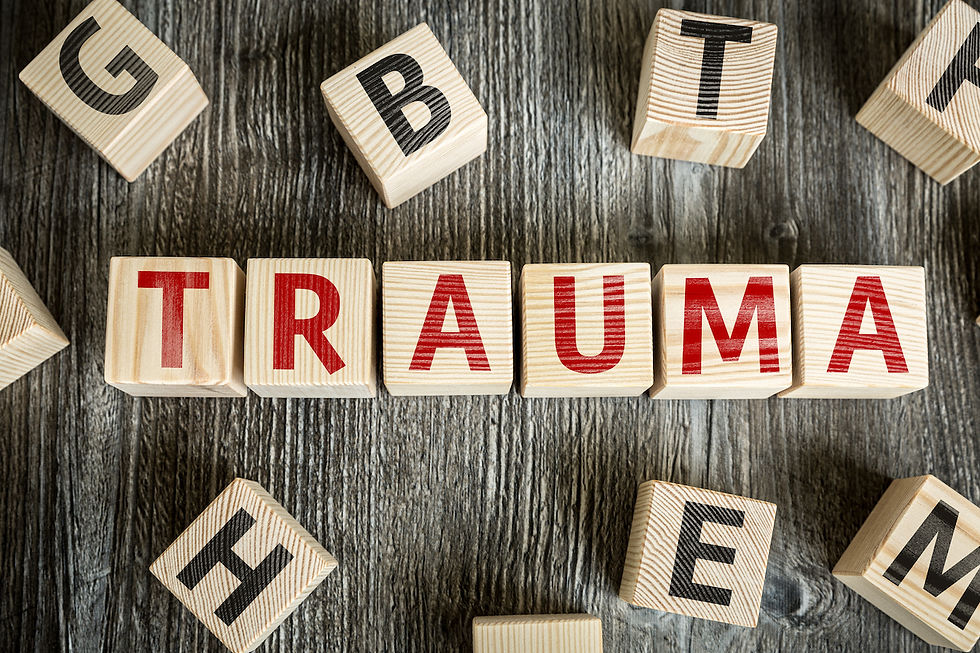The Impact of Unresolved Trauma on Relationships
- Gary Katz

- May 30, 2024
- 3 min read
Updated: Jun 5, 2024
Your relationship may be suffering because of trauma.
Last week we discussed how trauma which is unresolved and unhealed can lead to emotional turmoil. Today we’ll look at its impact on relationships.
Unresolved trauma can significantly impact an individual's ability to form and maintain healthy relationships. People who have experienced trauma may struggle with trust issues, leading to difficulties in developing deep connections with others. The emotional and psychological wounds from unresolved trauma can also cause individuals to become hyper-vigilant, constantly on guard for potential threats or triggers. The brain seeks safety and is constantly looking for potential threats and dangers. Consequently, this ongoing state of alertness can strain relationships and create distance between the individual and their loved ones.
Intimacy is developed slowly by building trust, one step at a time. When someone struggles to feel safe enough to take each step into deeper intimacy, they often repeatedly get stuck at the same point in relationship after relationship. This can show up in many ways, including:
The person who dates and dates but can’t get into a relationship.
The person whose relationships get to a certain point each time and then end.
Losing attraction as the intimacy deepens.
Keeping others at arms length with anger or other ways.
The person who is needing constant affirmation and reassurance.
The person who seeks unavailable people whether emotionally unavailable or for other reasons.
The person who keeps “testing” their partner to prove their love.

Couples and individuals who come into our offices are seeking to feel better or understand WHY they are struggling. We can look at the surface causes and teach relationship skills but what really needs to be addressed are the underlying reasons for these behaviors which are usually strategies learned from a reaction to trauma. By seeing and resolving the underlying trauma the clients can move forward to have the intimacy they have been yearning for.
Emotional distance is another way that people who have experienced trauma may struggle in relationships due to unresolved trauma. They may fear vulnerability or getting hurt again, leading to a tendency to keep emotional distance from others. This emotional distance can prevent individuals from fully engaging in relationships, making it difficult for their loved ones to connect with them on a deeper level. Over time, this emotional detachment can strain relationships and create feelings of disconnection.
Triggers and Overreactions: Unresolved trauma can leave individuals more susceptible to triggers, which are reminders of the traumatic event. These triggers can range from specific sounds or smells to certain behaviors or situations. When triggered, individuals may experience intense emotional distress or even re-experience aspects of the trauma. This can lead to overreactions or emotional outbursts that may be difficult for their loved ones to understand or navigate, straining the relationship.
Communication Difficulties: Trauma can impact an individual's ability to effectively communicate their needs, emotions, and boundaries. Unresolved trauma may lead to difficulties in expressing oneself, articulating emotions, or setting appropriate boundaries within relationships. This can create misunderstandings, frustration, and a lack of emotional connection between individuals, hindering the growth and nurturing of healthy relationships.
Codependency or Avoidance: Unresolved trauma can manifest in codependent or avoidant behaviors within relationships. Some individuals may develop codependent tendencies, seeking validation, safety, and security from their partners to compensate for unresolved trauma. They may be overly focused on the other and not aware of their own feelings and needs. Or, they may be aware of their own needs and wants but unable to share them for fear of being let down.
If you feel that you or your relationship may be suffering from the impact of trauma, please reach out today to schedule a consultation and start feeling better!






Finding the perfect wedding vendor can be overwhelming, but https://wezoree.com/ makes it effortless. With detailed reviews and expert recommendations, couples can confidently choose photographers, planners, and more. The platform simplifies the process, ensuring every detail is flawless. Whether planning locally or abroad, https://wezoree.com/ is the ultimate resource for a dream wedding.